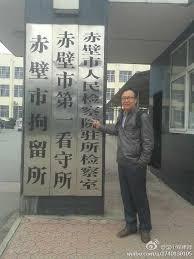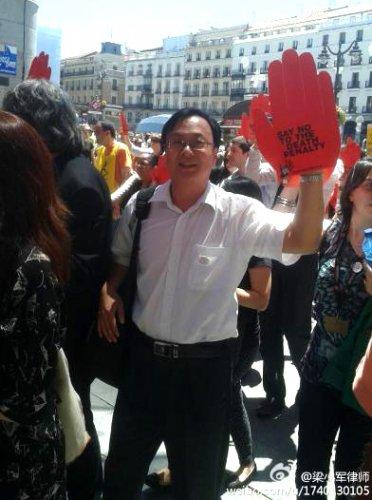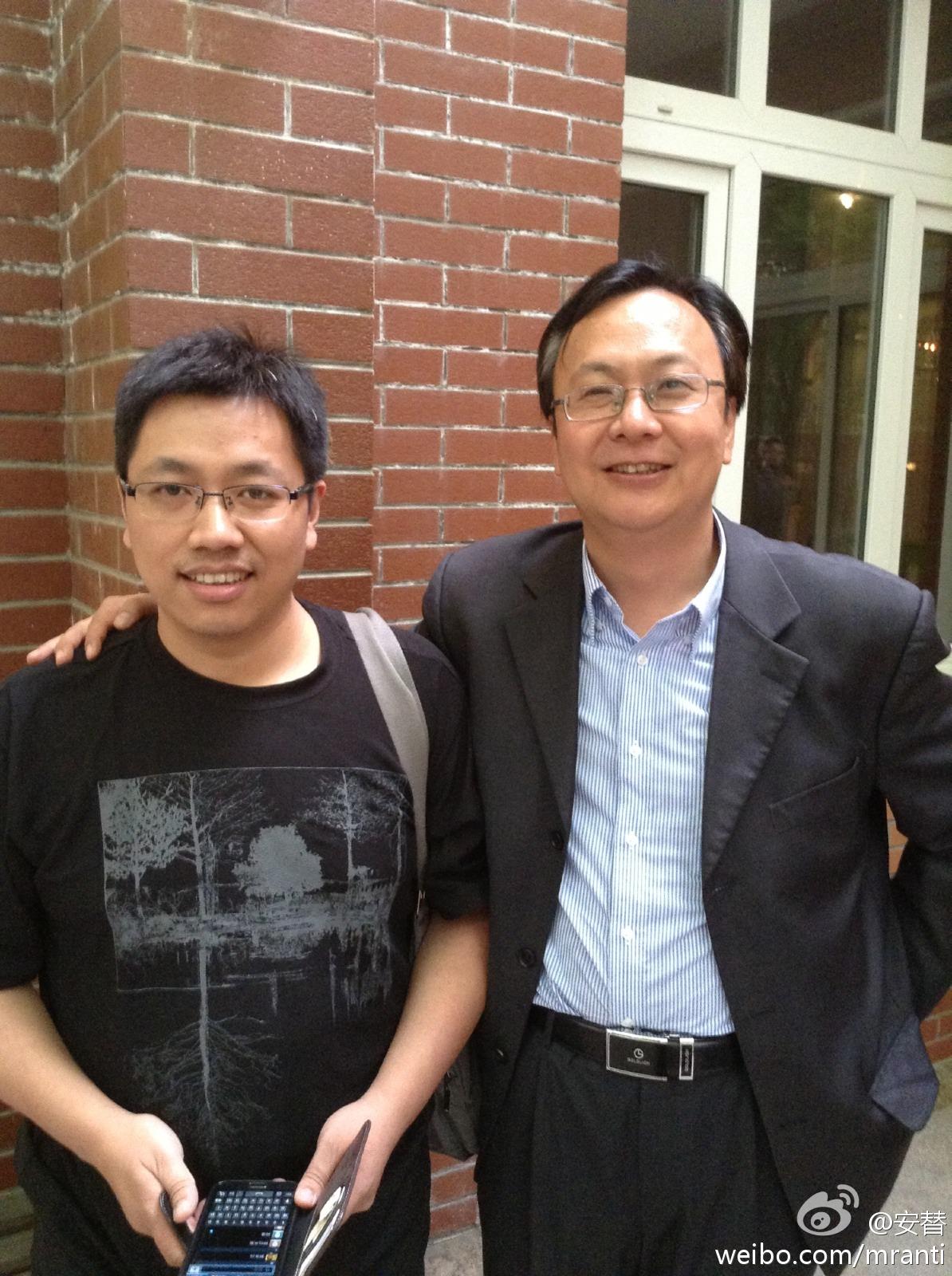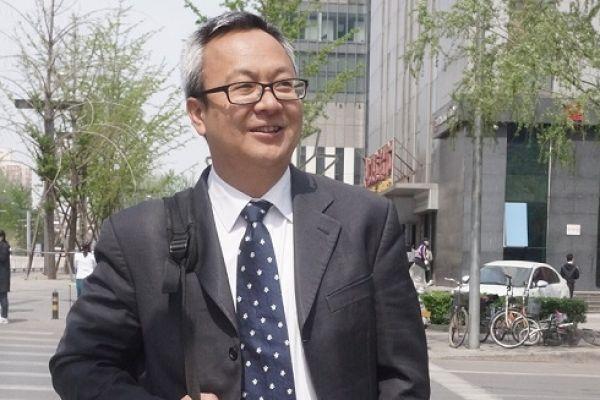Director of a law firm in Beijing. Graduate of the prominent China University of Political Science and Law. Son of a wealthy Chinese Communist Party cadre.
Liang Xiaojun is all these things — yet he’s also willing to risk police surveillance and arrest to defend the disenfranchised in Chinese society: maligned death row inmates, house Christians, and Falun Gong prisoners of conscience.
Liang’s commitment to upholding legal rights stems from his observing injustice in China endlessly play out.
“I once defended a person of faith in Chenghai, a district in Shantou City,” he told Epoch Times in an interview. “The person said had been illegally detained at a local legal education school, and was deprived of sleep for over 10 days, threatened, and intimidated. When he explained the situation to the court prosecutor, the prosecutor said: ‘You must’ve committed a crime if the public security officers resorted to torture to extract a confession.’”
A trip to Xi County in the central Chinese province of Henan left Liang feeling that being a lawyer in China is “too tiresome”: “Even though there is the law, the police officers there say, ‘I listen to my leader,’ and the prosecuting officials say, ‘Don’t talk to me about the law; I won’t let you review the court documents.’”
Epoch Times recently spoke with Liang Xiaojun about his work in China; below is an abridged translation of the interview, edited for clarity.
Epoch Times (ET): You started out studying politics and ideology — why did you elect to enter this field back then?
Liang Xiaojun: I entered college in 1991. Then, politics thickly permeated China’s atmosphere, especially after the Tiananmen Square Massacre in 1989.
My father was a Party member and was very leftist in his thinking. He strongly supported the Party’s position and believed that the leadership of the Party was unshakable. Because studying politics could allow one to get a job more easily, my father chose this field for me. And so I sat for an exam and was admitted to the Hebei Normal University.

What I learned was useless. In fact, I don’t like politics, especially the teachings of Marxism-Leninism and Maoism. I learned poorly, didn’t enjoy the lessons, and felt that the teachings were meaningless.
I led a life of affluence, and didn’t encounter any major setbacks. My life was very peaceful and ordinary, and I didn’t have any direct contact with the poor.
But I did observe those living in the farming villages, and I greatly sympathized with them. The country was developing, but why did so many people have to live in poverty and ignorance? The city dwellers discriminated against the villagers, and I found this hard to understand.
I feel that villagers and those in the cities should enjoy the same level of development, and that there shouldn’t be any discrimination. There is injustice in society, I thought, and felt that there should be some sort of system in place to reverse this unjust phenomenon.
Even though I was being indoctrinated with Marxism-Leninism, and the Maoist stuff, I still enjoyed traditional Chinese culture much more. I would read Confucius’s “Analects,” and selections from Mencius. It was from these ancients that I learned about giving up one’s life for a noble cause, and other teachings of virtue. This spiritual pursuit impacted me profoundly.
Meanwhile, I was studying law, and believed that there was something about the law that was worth exploring. For instance, the law embraces values like fairness and justice, which is in fact similar to the concept of “yi,” or “righteousness,” from traditional Chinese culture; in reality, these values are complementary.
ET: Are you still in contact with your classmates from the China University of Political Science and Law? You are all in the same profession, but why do you serve different clientele?
Liang: Of the over 100 classmates at the university, I’m possibly the only one on the rights defense path. I spoke to some classmates in university groups, but they didn’t understand me. Some even quit the groups I belonged to…
Some of us from the China University of Political Science and Law work in the public security system, and we know each other. But they can’t understand the sort of legal cases I take up.
So I haven’t been in contact with my classmates from the Hebei Normal University and the China University of Political Science and Law. First, we have nothing in common. Second, they are keeping their distance from me.
It’s better that my classmates just do what they do. I’m being monitored, and that could affect them if we keep in touch because many of them are government officials. After considering their situation, I’ve decided not to contact them.
That being said, I feel that what I’m doing is excellent and correct. I’m living up to the spirit of the law and defending human rights—there’s nothing wrong with that. I’ve found other kindred spirits, and we share a common conviction.
ET: Does the name “Daoheng” (道衡) in your Daoheng Law Firm have anything to do with traditional Chinese culture?
Liang: I did think about traditional Chinese culture when coming up with a name. The character “dao,” (道) is derived from “The Tao that is the way that can be followed, but it isn’t an ordinary way,” and “Taoism follows nature,” while “heng” (衡) means “balance.”
ET: Why are the words “Paying Attention to the Death Sentence” in Daoheng Law Firm’s corporate logo?
Liang: We’ve accepted several death-penalty cases. Some of our clients have their sentence reduced to life imprisonment, or a limited term of imprisonment, and some were even found not guilty.
As a lawyer, when my clients are handed the death sentence, I’m not heartless to the point where I feel nothing. I don’t know what judges who pass the execution order are thinking, because they are required by legal procedure to meet the defendants, the people on death row. After meeting with them, these judges order the execution, and it is done. I don’t know how the judges cope mentally.
Anyhow, I feel very uncomfortable when I know that my clients are going to be executed; I even have dreams about executions and my clients at night. People commit drug-related crimes because they are poor. For a little money, drug mules lose their lives. Being poor isn’t their fault, and killing these people doesn’t solve the problem.
China has always handed out harsh punishment to drug criminals. However, drug-related crimes haven’t lessened, and are in fact increasing. The death penalty is a complicated legal and political issue. An authoritarian country needs the death penalty to maintain its rule, and to intimidate the people.
ET: Chinese law firms usually have a Party committee and Party leaders. Does your law office have a Party committee?
Liang: Daoheng Law Firm doesn’t have a Party committee.
ET: What sort of court trials do you feel are the most oppressive?
Liang: The trial of Liu Wei from Sichuan Province was the most oppressive court case I’ve experienced.
Liu was a student at the Beijing Polytechnic University and a Tiananmen protester. After he quit school and returned to Sichuan, the police continued to harass him. So all he could do was rights defense and dissident work.
The Chinese Communist Party’s use of intimidation tactics dissident cases is unrivalled—when court is in session, large numbers of riot police enter the courtroom wearing metal helmets and carrying rifles loaded with live rounds.
Also quite oppressive are cases involving Falun Gong [a traditional Chinese meditation practice persecuted in China].
ET: What effect did the widespread arrest of lawyers in July 9 last year have on the legal community in China?
Liang: The suppression succeeded in some areas, but I feel that new lawyers are stepping out in large numbers. Everyone is persevering and going on with it.
ET: There are many lawyers, but there aren’t many “human rights lawyers.” Why did you decide to become one?
Liang: As a defense lawyer, I discovered that there were many people who were being suppressed by the country’s authorities, resulting in their being unfairly tried and sentenced.

In 2008, I represented Kashgar Alimujiang in Xinjiang, a typical case of political and religious persecution. Alimujiang, a Christian who converted from Islam, was marked by the local religious bureau after he started organizing a family church. He was later arrested for “providing state secrets to foreigners,” and sentenced to 15 years in jail.
The Xinjiang procuratorate didn’t have enough evidence to prosecute Alimujiang, and his actions didn’t make him guilty, either. But he was convicted regardless.
When I later started representing Falun Gong cases, I found that it difficult to meet my clients, difficult to review court documents, and difficult to secure a court trial. It was challenging every step of the way because there was interference from public security forces, the procuratorate, and the courts.
After taking on Falun Gong cases, I realize that under the current Chinese system, they are the most severely persecuted group. So I decided to defend these people whose rights have been truly violated.
Since 2009, I’ve accepted between 80 to 100 Falun Gong cases. The authorities have piled intense pressure against me—the judicial bureau came looking for me, and so did other departments. These departments told me that I couldn’t represent Falun Gong practitioners, and that what I was doing was very dangerous.
Because the pressure was so immense, many lawyers who worked on these cases have since stopped representing Falun Gong practitioners. But I’ve always persisted.
ET: What are you working on these days, and what is your most recent case?
Liang: The lawyers who were arrested in July last year are all my friends, and I’ve always wanted to help them.
I’m now in a situation where the detention center in Tianjin is saying that my client has hired another defense lawyer, and they are thus rejecting my legal representation. This situation is also faced by every other lawyer that was hired by the family of the lawyers arrested during the 709 crackdown.

Although I’m now rather busy, I try to help out whenever I can with Falun Gong cases because I know that it is difficult for them to find a lawyer.
My most recent case involves a Falun Gong practitioner from Changping District in Beijing. My client was arrested for hanging up banners that promote Falun Gong. Cases like these are very rare in the past two years, and most people are instead arrested for passing out Falun Gong material and CDs. I think that hanging banners is a rather special and courageous act.
ET: Do you think that the act of hanging banners, even if a person admits to it, counts as breaking the law?
Liang: I don’t think that’s breaking the law. I say this in every court: These people are protesting in a very rational and non-violent fashion, and pose no harm to society.
So I think that we should support this form of protest. Suppressing Falun Gong adherents for this is a violation of their personal and property rights.
I always say that we should give these people a channel to speak. You can’t close every channel, and forbid people from speaking; this just doesn’t work! The regime should let people speak, regardless of what they say, because they have the right to free speech.
The regime can’t always resort to repression or use legal means as a form of suppression.
ET: What are your fees like for Falun Gong cases?
Liang: I can’t accept too much money from Falun Gong practitioners. This group has been suppressed for over 10 years, and its adherents lead very difficult lives.
On a personal level, I’m fine with leading a regular life, a secure life. If I could do some meaningful things, that would also be enough. In normal times, I live very simply—apart from doing what I believe in, I educate my child, read, and write articles. That’s good enough for me.
Really, my life’s rather monotonous. I don’t smoke, don’t drink, don’t go to social events, and don’t have much social interaction. So I don’t have much need for money.
ET: Some people think that by taking Falun Gong cases, you’re going against the authorities, and are “being political.” What are your thoughts on this?
Liang: Politics is everywhere. It is everywhere in our lives. You can’t get away from politics even if you wanted to. This is especially so for those who study politics and the law; given my education background, I pay attention to China’s political issues.
As a lawyer, I take up Falun Gong cases because I think these cases and their sentencings violate the idea of the rule of law, and are against the spirit of fairness and justice. That’s why I take up these cases, and I don’t think that they are political in nature.


